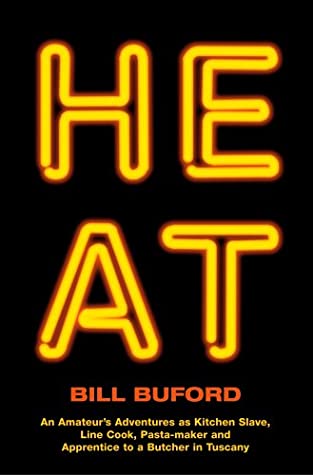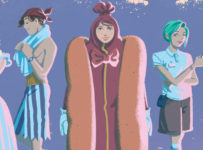By the time Bill Buford’s Heat and its impossibly long subtitle came out in 2006, the modern era of food writing was well and truly kicked off; Anthony Bourdain was on his fourth book and second television series. Buford is not Bourdain, but no one was. Rather than being from a chef turned writer, Heat: An Amateur’s Adventures as Kitchen Slave, Line Cook, Pasta-Maker, and Apprentice to a Dante-Quoting Butcher in Tuscany is the tale of its author’ journey from writer to at least cook, if not a chef.
Heat is different to read fourteen years later, especially as the man who opened so many doors for Buford was ultimately revealed to be a sex pest (to put it mildly), but fortunately it’s about so much more than that.
Bill Buford, a journalist and editor, made the acquaintance of Mario Batali in the early 2000s and asked if he could take the opportunity to experience life in a professional kitchen. Skipping a hell of a lot of steps in any professional chef’s development, Buford is eventually trusted to prepare and plate dishes at Batali’s Babbo, and along the way he makes multiple trips to Italy to explore the meanings and origins of food, to the point of learning the language and reading ancient historical texts in their original forms.
It is impossible to read Heat without addressing the elephant in the room: that of Mario Batali. Knowing of his misconduct, there is absolutely no reading between the lines in Heat, where Batali frequently commits light (albeit hands-free) harassment, constantly makes boorish comments and dismisses pure duck broth as “too faggoty French”. He’s clearly a man with a lot of instinctive culinary knowledge and business acumen, and his generosity to Buford can’t be overstated … but he’s definitely a product and exemplar of a culture that, in the words of Bourdain “allowed the kind of grotesque behaviors we’re hearing about all too frequently”.
Buford follows in many of the footsteps of Batali, as most of the people he encounters in Italy either trained Batali or Batali’s family members. But, faced with the desire to hone his craft rather than prove himself as a chef or restaurateur, Buford has a distinctly different approach — more than that, he has patience.
There’s little need to explain the running order of Heat, because Buford reveals all in that subtitle. There’s a lot to learn here, about the lives of Buford and the chefs he trains with, the cuts and traditions that they perpetuate, and the contentious history of whose cuisine reigns supreme (in the context of this book: Italy, and more specifically Tuscany. Down with France!)
Buford does an amazing job of playing an everyman, despite the intense combination of luck, connections, and upward mobility that he displays in pursuit of his goal. Buford tries to come across as a bumbling American oaf, but his persistence and personability endear him both to the reader and his teachers. The people and places Buford investigates are equally fascinating, and Buford’s clear interest in his subject matter is communicated effortlessly. You may question the wisdom of carting a pig corpse across town and butchering it in your own kitchen, but the results speak for themselves; if Buford doesn’t end Heat a maestro, he’s definitely far more proficient and knowledgeable than when he began.
Frequently disarmingly frank, Buford has no qualms directly reporting what one kitchen worker had to say about another, which may have had deeper repercussions if they hadn’t all moved on to different kitchens by the time of publication. This book did take years to put together, but there is still a palpable sense of danger in the scale of disclosure that Buford makes. There are skills and techniques that multiple Italian artisans beg Buford not to share with Batali; hopefully the detail that he goes into is just vague enough that he hasn’t betrayed the ancient Tuscan arts.
Hilariously, Heat ends on a cliffhanger, and one that wouldn't be followed up in print until 2020’s Dirt: Adventures in Lyon as a Chef in Training, Father, and Sleuth Looking for the Secret of French Cooking. The final paragraph of the book is delivered with all the solemnity of “I am just going outside and may be some time” or of Buford inviting himself into the Avengers Initiative.
On the strength of Heat, it would be foolish to resist Dirt. There’s not even a discomfort in getting to know Mario Batali, because so much of what we would come to know was on the page. Still, it’s not about him: it’s about one plucky writer, the incredible serendipity of his life after choosing to change direction midstream, and the kindly Italians who took him under their wings and taught him many of their secrets.



